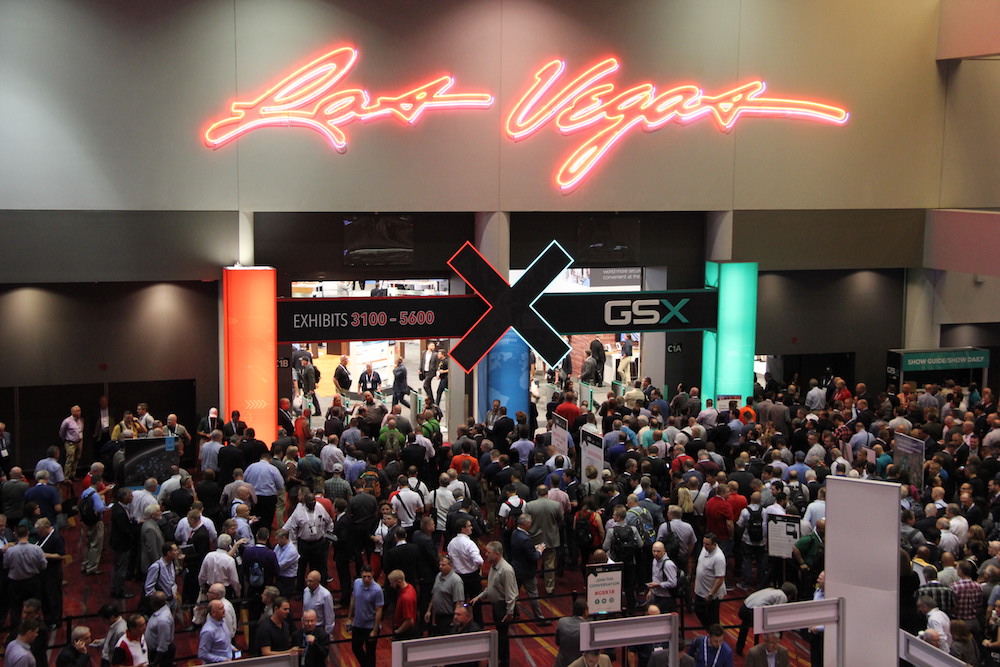
Features
Top security trends to expect at GSX 2019
August 13, 2019 By Bill Maginas, President, Johnson Controls, Canada
 GSX 2018 in Las Vegas
GSX 2018 in Las Vegas In a few weeks, thousands of security professionals will descend on Chicago, Illinois for four days of thought leadership and education at GSX 2019. This premiere event focuses on all vertical markets, making it a can’t-miss event. With hundreds of learning sessions and exhibitors, GSX is the ultimate space to network, discover new technologies and share insights on the security landscape.
Compared to last year, GSX 2019 is expected to have a heavier focus on the convergence of security systems and the affect data is having across business markets. Cybersecurity will also be a hot topic as it continues to be a top interest area among end users. Continue into the following sections as we take a deeper dive into the predicted conversations at GSX 2019.
Convergence of physical and IT security
Many enterprises, due to their size, are challenged with the ever-growing complexity of the implementation, control and compliance of their different operational systems. Physical security and IT systems present unique hurdles when disparate. Introducing centralized monitoring to a building’s security strategy can help with efficiency and cost control. For example, when compliance and reporting are overlooked by one source, this leads to more proactive management which means labor and audit costs can be minimized. At GSX, how to successfully bridge the gap between these systems will be a question from owners and security directors. This should come to no surprise as systems integration is expected to have the biggest impact on smart city plans in North America over the next five years, according to Johnson Controls Smart City Indicator Survey.
Smarter, data-enabled solutions
Smarter, more connected infrastructure has been a main objective of customers in recent years as they have seen the benefits come to life across vertical markets, including healthcare. The healthcare industry has been transforming their approach to security and how the success of safety programs are measured. It used to be that the number of security incidents that were responded to in a designated amount of time determined how safe a healthcare facility was. Today, healthcare directors are shifting to more qualitative measurements and answering the how. How well did a healthcare system respond to a security issue? To answer this question, connected, smarter security systems can help the healthcare industry proactively address risks and improve patient care.
Nuisance alarms are a top problem at healthcare facilities as they can negatively affect response to real emergency alarms. Cloud-based security platforms can help with root cause analysis and stop the activities that trigger nuisance alarms. Data can be gathered from multiple sources around the facility to begin a risk assessment and eliminate unnecessary response. A prime example is when a visitor enters through an emergency exit. The cloud-enabled system can help alert the security director in real-time and use the insights gathered to decide the best course of action. This intelligent, connected technology can help increase security efficiencies while also allowing healthcare providers to focus on their patients. Data is crucial to optimizing safety strategies and healthcare is only one of many industries that become more secure through the integration of data-driven applications.
Cybersecurity
It is hard to discuss data-enabled solutions without also bringing up cybersecurity. As end users begin connecting security with other building systems and planning for digital transformation, cybersecurity is a major concern for them. It is important for them to have offerings that will take proactive actions against cyber threats and minimize risks. Physical security solutions must be designed, deployed and maintained with capabilities that will allow them to keep a resilient front against cyber-attacks. It is critical for these solutions to be able to adapt and evolve throughout their lifecycle to combat threats. There are global standards, such as ones put in place by the International Society of Automation and International Electrotechnical Commission, that define the requirements and procedures for assessing security performance. To continue to help drive the security industry forward, it will be critical for all exhibitors at GSX to be prepared to speak about cybersecurity and the actions they are taking to help secure their customers’ environments.
Intelligent security will lead the way at GSX
The overarching theme of the above trends is intelligence. Smarter, data-enabled and integrated security solutions are paving the path to a more secure world. From systems integration to cloud capabilities, more intelligent technologies are helping to empower businesses to address potential threats and respond to emergencies faster. At GSX and beyond, it will be important to continue conversations around how more advanced security strategies can help end-users become better protected for the future.
Print this page
Advertisement
- Resideo appoints new GM for ADI North America
- Select Speco IP cameras now integrated with Eagle Eye Networks